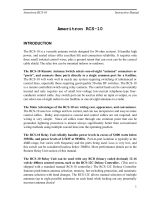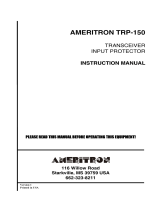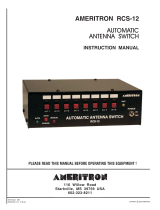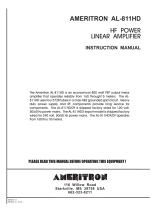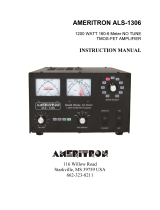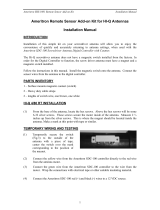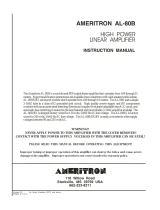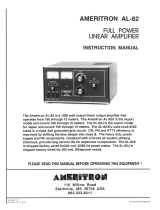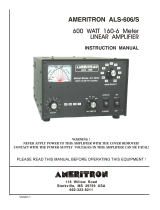


INTRODUCTION
The Ameritron RCS-8V is a remote controlled coaxial RF
switch that will operate with negligible loss, radiation and
VSWR at all frequencies up to 250 MHz. Only a slight
compromise in VSWR occurs at 450 MHz. Power rating
is four kilowatts PEP below 30 MHz and one kilowatt
PEP at 150 MHz.
The RCS-8V permits the operation of up to five separated
antennas with only one coax feedline. A rotor or
telephone type control cable with a minimum of five
conductors is required.
The control console selects the supply voltage for the
relay box. The front panel has five LED’s that indicate
the antenna that is in use.
The RCS-8V operates on +12 Vdc voltage. The RCS-8V
is supplied with a +12 Vdc adaptor for 100-120 Vac input
50/60 Hz. The RCS-8VX is supplied with a +12 Vdc
adaptor for 200 to 240 Vac input 50/60 Hz.
The RCS-8VL models include Gas Discharge Tubes
attached to each antenna terminal.
INSTALLATION
The relay box may be mounted on a tower leg, mast or
building wall. The mounting hardware furnished will
accept a tubular mast up to 1 ½” diameter.
If the box is mounted on a building wall discard the “U”
bolt assembly and use two ½” screws to attach the bracket
to the wall.
The relay box must be mounted with the connectors
down. Do not attempt to air seal the relay box. Install
drip loops below the box if the feedlines are brought in
from a higher location. Lightning retarding loops area
recommended precaution on all cables (see Figure 1).
Relay Box Cable Connections
Inexpensive five or more conductor rotor or telephone
cable can be used to connect the relay box to the control
console. The only requirement is that the cable be
physically able to survive the environment it is installed.
Wire gauge and voltage breakdown are not critical.
Conductor and ground return (through the coax shield)
resistances can total 80 ohms before operation becomes
compromised.
Remove the four screws at the corners of the panel and
remove the cover. Route one end of the control cable
through the bushing in the panel and through the plastic
cable clamp.
Connect five of the wires in the cable to terminals 1 to 5.
Make a note of the color that is connected to each
terminal. If a sixth wire is available in the control cable,
connect it to the “G” terminal.
Reinstall the cover on the panel using the self-tapping
screws previously removed.
The indoor console and outdoor relay box must have a
ground reference to each other. Either by RF, earth
ground, or a ground wire in the control cable.
THIS LENGTH MAY VARY UP TO
3 FT. IT MUST NOT CONTACT
THE MAST OR TOWER
TAPE TO THE MAST OR TOWER FOR
SUPPORT NEAR THE RELAY BOX
MOUNTING LOCATION
2 TURNS 6” DIA. ON ALL CABLES
LEAVING AND ENTERING THE
RELAY BOX. KEEP COILS SPACED
FROM EACH OTHER BY VERTICAL
OR HORIZONTAL SEPARATION OF
2” MINIMUM
TO ANTENNA
LIGHTNING RETARDING LOOPS
Figure 1
Relay Box Antenna Connections
Connect your antennas to coax connectors numbered 1-5
and note which antenna is connected to each connector.
Connect the feedline to the connector marked “INPUT”.
If control power is removed, the relay box automatically
disconnects the “input” feed connection from all antenna
ports.
Unselected antenna ports may be automatically grounded
or isolated. The RCS-8V is shipped with the ports
isolated. To automatically ground the unselected port, a
short jumper must be installed as shown in Figure 2.
More than one antenna port can be “picked up” at one
time by applying control voltage to more than one relay at

one time. This allows the user considerable flexibility in
stacking arrays of similar antennas.
The “input” port is the common connection port. It can
also be used as an output, selecting up to five inputs, or
left floating if cross-matrix switching between the various
“Ant” ports is desired.
Control Console Connections
Locate the RCS-8V control console at a convenient
location on the station operating desk.
The control console supplies 12V DC control voltages.
Caution must be exercised when connecting the RCS-8V
to prevent damage to station equipment.
Connect the five wires in the cable to terminals 1-5. Use
the same color code that was used on the relay box. If a
sixth wire is available in the control cable, connect it to
the “G” terminal.
IMPORTANT: Connect the “G” terminal to the station
ground buss.
OPERATION
1. Plug the adaptor into a proper outlet.
2. Connect the adaptor’s plug into the power jack of the
console.
3. Place the PWR switch in the “ON” position.
4. Rotate the SELECT control and observe the lights
one through five.
The switch positions are numbered on the front of the
control box and a space is provided above each position
so you can pencil in a designation for each antenna.
IMPORTANT
1. NEVER switch antennas with RF power applied to
the master feedline. Damage to the switching
contacts may result from “hot switching”.
2. If one of the lights is dimmer than the rest, it is an
indication of a short in the control cable or between
terminal screws.
PARTS LIST
Designation Description Ameritron Part #
C1 0.1 uF, 50 V 200-3100
C2 0.1 uF, 50 V 200-3100
LED 1-5 Red LED 351-5002
R1 470 ohm, ½ W 101-2470
RELAYS SPDT Relay 406-4681-1
S1 Rotary Switch 500-0563
S2 On-Off toggle switch 503-1233
GDT1-5 Lightning Suppressor
(L Model Only)
304-6120
12VDC Adapter
100-120 VAC Mains
MFJ-1312D
12VDC Adapter
200-240 VAC Mains
MFJ-1312DX

SCHEMATIC

Notes:

Notes:

DISCLAIMER
Information in this manual is designed for user purposes only and is not intended to supersede
information contained in customer regulations, technical manuals/documents, positional handbooks, or
other official publications. The copy of this manual provided to the customer will not be updated to
reflect current data.
Customers using this manual should report errors or omissions, recommendations for improvements, or
other comments to Ameritron 116 Willow Road, Starkville, MS 39759. Phone: (662) 323-8211; FAX:
(662) 323-6551. Business hours: M-F 8-4:30 CST.
AMERITRON
116 Willow Road
Starkville, MS 39759 USA
662-323-8211
LIMITED WARRANTY
Ameritron warrants to the original purchaser that this product shall be free from defects in material or workmanship for one
year from the date of original purchase. During the warranty period, Ameritron (or an authorized Ameritron service facility)
will provide free of charge both parts and labor necessary to correct defects in material or workmanship.
To obtain such warranty service, the original purchaser must:
1. Complete and send in the Warranty Registration Card.
2. Notify Ameritron or its nearest authorized service facility, as soon as possible after discovery of a possible defect,
of:
a. The model number and serial number, if any:
b. The identity of the seller and the approximate date of purchase;
c. A detailed description of the problem, including details on the equipment.
3. Deliver the product to the Ameritron or the nearest authorized service facility, or ship the same in its original
container or equivalent, fully insured and with shipping charges prepaid.
Correct maintenance, repair, and use are important to obtain proper performance from this product. Therefore, carefully read
the Instruction Manual. This warranty does not apply to any defect that Ameritron determines is due to:
1. Improper maintenance or repair, including the installation of parts or accessories that do not conform to the quality
and specifications of the original parts.
2. Misuse, abuse, neglect or improper installation.
3. Accidental or intentional damage.
All implied warranties, if any, terminate one (1) year from the date of the original purchase.
The foregoing constitutes Ameritron's entire obligation with respect to this product, and the original purchaser and any user
or owner shall have no remedy and no claim for incidental or consequential damages. Some states do not allow limitations
on how long an implied warranty lasts or do not allow the exclusion or limitation of incidental or consequential damage, so
the above limitation and exclusion may not apply to you.
This warranty gives specific legal rights and you may also have other rights, which vary from state to state.
/
